- Old Draft: Beatles Folk Memory 1970-1995 - December 8, 2025
- Lights are back on. - December 8, 2025
- From Faith Current: “The Sacred Ordinary: St. Peter’s Church Hall” - May 1, 2023
“They were getting to be like Paul’s band, which they didn’t like,” quoth the Yoko, via The Huffington Post. The interview’s from 1987, and it’s from Rolling Stone, so we can expect it to be simple-minded and St. Lennon-ish; but this canard deserves a bit of scorn. Can I? Thanks.
Oh what a shame it was for Paul to run roughshod over those other three grown men, forcing stuff like “Hey Jude” and Abbey Road on the world. Why, instead of wasting all that time, John and Yoko could’ve given 500 more interviews, and filmed countless more asses. Or John could’ve continued to explore the fascinating nexus of ragged Chuck Berry covers and heroin. And let’s not forget George, who supposedly suffered the most during Paul’s reign of terror. After all, George was in a living hell, a 27-year-old musician with the time and money and prestige to record anything he wanted with anyone, take long excursions to India, and buy his own freakin’ castle. (And what do you think paid FPSHOT’s bills in the 70s, 80s and beyond? Dark Horse, or Abbey Road?)
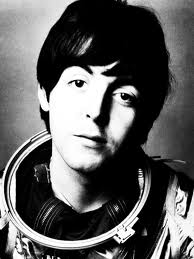
History’s greatest monster, preparing to extend his terror into space
I‘m being internet-dickish, I know, but the interesting question isn’t who broke up The Beatles but who said they had to break up? John and Yoko had been doing the John and Yoko Show for 18 months before April 1970; George and Paul had been recording whole LPs, producing groups, and writing and playing on Top 10 hits for other groups. Ringo wasn’t restricted by being in The Beatles—he was making movies (as John himself did in 1966). Far being a distraction from other pursuits, John/Paul/George/Ringo’s later Beatle activities gave them all more opportunities…and funded them to boot! (Yoko’s art installations were not big money-makers.)
OK, so maybe they had to break up to extricate themselves from Apple? Nope—they are still tied together by Apple, fifty years later. Apple will live on long after each Beatle is dead. Apple business meetings went on, pissing them off and making their lives worse, long after April 1970. If they’d stayed Beatles, they’d eventually have found a way through to where they are today. And the 70s would’ve been a lot more comfortable for all of them—maybe even Paul included—if they had been making an Beatle LP every year or two. They could’ve recorded the exact same songs, and sold many more of them; partly because of fan loyalty, but also because the songs would’ve been better.
The only good thing the breakup did for the four of them was—perhaps—discourage people from asking when the next Beatles thing was coming out. And it didn’t even do that; John bitched for the rest of his life about people asking when the group was getting back together!
Did Yoko break up the Beatles? No, but she didn’t help
So: the breakup was totally unnecessary, totally illogical, and in the end, totally useless. All it did was sow bad blood between the four of them, and stem the most amazing flow of creativity in the history of popular music. Maybe breaking up was a lucky break; maybe everything they’d do after April 1970 would’ve magically sucked; maybe it was time for them to stop. But all the reasons they ever gave/give, and the actual facts of the matter, don’t suggest breaking up was either obvious or inevitable. Nor did it do much good for them except perhaps psychologically. (Guys: that’s what therapy is for. It’s embarrassing, but so are lawsuits. And therapy’s cheaper, too.)
Yoko Ono didn’t break up The Beatles, John Lennon did—a fact which was obvious even as of Philip Norman’s Shout! in 1982. But there’s a reason why the “bad Yoko” meme won’t die, and it’s not the International Anti-Fluxus Conspiracy. The sources are absolutely solid on how Yoko played an instrumental role in creating John’s mindset towards The Beatles between 1968 and 1970. Was she constantly trying to convince her lover-then-husband of the great worth of the group, and the unimaginable access it would give him for as long as he remained a Beatle? Was she working to keep the fruitful (not to mention insanely lucrative) Lennon-McCartney partnership together? Or did she dismiss the group and everything it had accomplished, increase tensions within it, and encourage John to think of Paul as at best a square and at worst an active brake on Lennon’s own genius? And then—as mentioned in a recent thread—did Yoko actively discourage John and Paul from getting back together in 1975? Or was that just a coincidence?
When you’re listening to the survivors talk about this issue, remember they are business partners; for Beatle product to be released, they must agree; they are all tied together and peace is profitable. Maybe Yoko gets The Beatles now; I hope she does, because they were great, and they belong to all of us. And yes, obviously, what to us is an LP or a song, to them was a good or bad day at the office, a friendship (or lack thereof). But I’m still waiting to hear any of them explain why they had to break up—except that John Lennon was feeling insecure and wanted to lash out at Paul. Maybe he had every right to lash out; maybe all of us would’ve felt the same way he did. But it’s an awful shame it went down that way, for us, for them and (maybe most of all) for John Lennon himself.
Even if Paul was a terrible shit, and bossy—even if every late 60s “Paul’s an arsehole” story about him is true—he didn’t break up the group. John Lennon did, for small and selfish reasons utterly beneath him. And Yoko encouraged him to do it, and also, does not sweat.

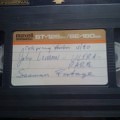

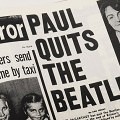
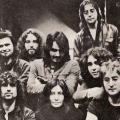
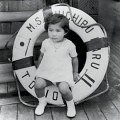
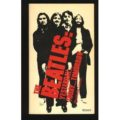
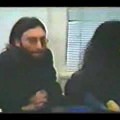


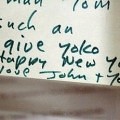
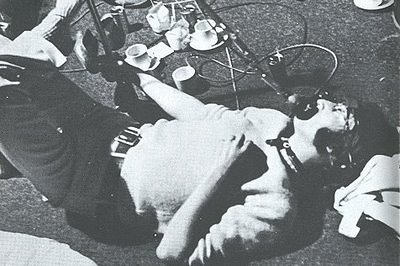
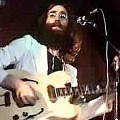
the breakup was totally unnecessary, totally illogical, and in the end, totally useless.
Instead of breaking up, the Beatles could have:
• released more collaborative albums, welcoming (and crediting) guest artists, like the ones who appeared on their later solo albums (Keltner, Voorman, Hopkins, Preston)
• experimented with Beatle albums spotlighting each member. For example, a Beatle album of all George songs, a Beatle album featuring Ringo’s country & western covers. A Beatle album with John’s experimental number nines, interspersed with his lyrically avant garde 1950s songs. Why not?
• an album with the Beatles producing, writing for and backing up a different lead vocalist, they way they backed up Tony Sheridan. Maybe a talented but under-appreciated lady r&b singer. Maybe resurrecting the career of a neglected girl group leader from the early ’60s. Ronnie Spector?
But they would have had to want to. You can put tasty, wholesome vegetables in front of a toddler, but if he kicks the plate off his highchair, there’s no nutritional value. I don’t think John wanted to. Why?
There are those who call Yoko a schemer, but wouldn’t a true schemer have encouraged John to continue the Beatles, so as not to kill the golden egg goose? I think she was blundering along just like John, not really knowing what she was doing, just reacting to behavior patterns launched in her childhood. If Lennon had auntie and mom issues, Yoko certainly had mommy issues, if Goldman’s brutal description of her relationship with Ono senior is to be believed.
Diz Gillespie broke up the Beatles.
– Hologram Sam
Re-reading my list of alternate universe Beatle album options, I see I left out a Paul song Beatle album; one where he has a hundred little songs that weave in and out with each other, so with vocals, some without. Sort of a continuation of what he was going for on the Abbey Road b-side.
I know this is long, but bear with me.
I consider myself to be an atypically-hardcore Beatles fan, and this manifests itself in any number of ways–Magical Mystery Tour is my favorite of their films, I don’t like Jude Southerland Kessler, etc. But perhaps the most profound of these divergences between me and, say, the folks who populate the Beatles Social Network is this: I both understand and appreciate the influence that Yoko Ono has had on culture.
The deep-seated loathing most members of the Beatles Fandom exhibit for Yoko is remarkable to me. I remember visiting the Beatlefest, watching Let It Be with my dad, and being startled by the frank expressions of animosity not only coming from the band onscreen, but also from the audience seated below whenever Yoko was shown. They would boo and hiss every time she appeared, as though they needed to ward off some kind of evil.
I was eleven at the time, and was flummoxed by this behavior because by that time, I had not only read but also owned Yoko’s book, Grapefruit. And I loved it. My young mind had already been blown open at age seven or so in my introduction to “I Am the Walrus”; three years later, when I found my library’s copy of Grapefruit, Yoko’s performance poetry seemed like a logical extension of the theme. As I delved deeper into her approach to art and discovered Fluxus and–importantly–her friend John Cage, I came to the dawning realization that I wanted to be not only a visual artist, like my father, but a conceptual one, like Yoko.
So, not having lost a shred of my fascination with the Beatles, I’ve ended up in the awkward position of trying to explain not her work or ideas, but Yoko’s very existence to often highly-resistant Beatles fans. Part of this difficulty lies in that Yoko’s art–and that of many of her cohorts–lies decidedly outside of the mainstream. Despite the Beatles’ forays into the experimental, their work remained pop and accessible, and bridging those worlds was the seat of much of their genius. Yoko’s work is no such beast. Even now, her efforts are far from exempt from the kind of armchair criticism leveled at much of art since 1920: what’s the point/my kid could do that/etc. When something as mainstream as the Beatles is brought in juxtaposition to Yoko and her far-out nature, the resulting clash of cultures riles up even the most mild-mannered of British humor writers, apparently.
This is all understandable, but I have found troublingly little success in trying to explain Yoko to most Beatles fans. Even when Paul himself says that it’s not Yoko’s fault and can’t we all get over this already, the chorus chimes in: “He has to agree with her or else she’ll make trouble with future Beatles products!” And on it goes, until it becomes clear that you’re facing a part of our existence still entrenched in culture: Yoko was a woman, and Japanese to boot, so there is no way she could have been anything but bad. And as such, her bewitching presence was so powerful that she destroyed the Beatles. Her spell made them turn from the best of friends into the worst of enemies.
John knew the absurdity of this position, and voiced it all the time. These days, you hear how his protestations were only a product of the time, or in an exercise in recursion, that Yoko somehow brainwashed him into saying these things. But even if one supposes that Yoko encouraged John to exit the Beatles, or tried to insert herself where she didn’t belong, she could only have ever been pushing a button that already existed. Giving her the power to control the Beatles is not only demeaning to the fully-grown men who made up the band, but also to subscribe to an impossible belief underpinned by uncomfortable beliefs about women, or foreigners, or contemporary art, or all three.
tl;dr: Yoko did not break up the Beatles. To claim that she could have done so is to give too much credit to the power of one person not even in the band, and often reveals sexism and/or racism in the logical void it creates.
Thanks for posting the kind of rant I thought of posting myself after reading that HuffPo piece, Michael! How insane is it that they’re printing a piece about a 1987 interview as if it’s news? And what kind of staying power do the Beatles have when that warmed-over bit inspires well over 2000 comments?
The only kind of necessity for the Beatles to break up was emotional, and came (as you point out) almost entirely from John Lennon. And I think a lot of that necessity derived from John Lennon’s personal life. He wanted out of his marriage, and Yoko offered him a ticket out of everything, a way to make a new life and (so I think he thought) wipe the slate clean. Two virgins with a love that has no past. But making that break entailed taking up a new artistic identity and defining the Beatles as something he’d grown out of.
I wonder, too, how much of his animosity toward Paul in the early 1970s has to do with Paul’s acknowledgement of Cynthia and Julian, two people John didn’t want to do much thinking about while he was breaking out. Paul was the one who went to visit Cynthia after John announced his break with her, and the one who wrote “Hey Jude” about Julian’s situation.
It seems probable that John’s so angry in the late 60s/early 70s because he’s smart enough to see that he’s treating some people (notably Cynthia and Julian) pretty crappily to get what he wants, and he really doesn’t want to deal with that. So he projects a whole lot of anger outwards. It can’t have escaped John’s notice that he pretty much walked out of Julian’s life around the time John’s own parents walked out of his.
All those unresolved personal issues simmering under the surface go a long way toward explaining John’s lasting bitterness toward the Beatles and towards Paul especially, I think. It’s not as if Paul was resolutely anti-Yoko when she and John got together: it was Paul who worked on “The Ballad of John and Yoko” with John, for crying out loud.
[Love that picture of Paul in the spaceman suit, BTW.]
Sam, all of those options and more were possible and interesting, and more worthwhile than breaking up…even if one gives full credit to the insane pressure on the four of them. The problem was that none of them realized that their situation would change over time–that the things they didn’t like about being Beatles would lessen, and the things that they did like, would largely remain.
And I think you’re right that Yoko–like John, and Paul and the rest of ’em–was just blundering along. Nobody knew in 1970 that The Beatles would still be popular in 1980, much less 2012–much less the cash-cow that they are today.
Great comment, Matt M. A couple of things to begin with: I’m 43, not only not British but from St. Louis, and my mom’s a painter, who raised me with the help of “strong women”–my grandmother, and my aunts. My stepdad came in later, but my early formative years were filled with artists and females, and female artists. So I don’t think my issue with Yoko–such as I have one; I’ve never met the woman–is about sexism. But it could be.
As to being racist, I can’t disprove that either–but I will say that 10+ years of meditation, which sprang from an ongoing fascination with Chinese, then Japanese history and culture–makes anti-Asian racism seem unlikely. But maybe?
If Yoko’s art inspires/inspired you, I’m glad that you don’t let Beatlefan malingering about her get in the way. But consider that perhaps people’s issues with Yoko Ono aren’t related to her sex or race or even her art, but a grating public persona, and the way she acted during the Beatle years. She doesn’t come off well.
Maybe she’s lovely in private. I’m about a degree-and-a-half away from Yoko, and what I hear is that she’s nice. I hope she is. But just like it’s not fair to dislike her because she’s female or Japanese, it’s also not fair to give her a pass because she’s A Great Artist or John’s widow.
I’ve said this before on the blog, but I’ll say it again because it may interest you: I think Yoko saved John’s life in 1968. I think after Brian died, he was next, and had there been no Yoko in the post-Maharishi period, he would’ve OD’ed. He was bored, using drugs heavily after a period of near-abstinence, and deeply depressed. But I also think that Yoko took one of the greatest popular artists of his generation and encouraged him to become status-obsessed, doctrinaire, haughty, materialistic, and often queerly humorless. That is, like Aunt Mimi…and UNLIKE The Beatles.
After Yoko, John becomes (or was revealed to be) a huge snob. Giving free rein to this flaw lessened his art, and his life. As a black-sheep daughter of a black-sheep member of an aristocratic family in a really rigid society, it’s understandable Yoko craved status, money, prestige. But unleashing those attitudes wrecked John Lennon. First they broke up The Beatles, then locked him in an unwinnable battle with Paul. They isolated him from the (gritty and populist) sources of his creativity, alienated him from his friends and most of his family, and even kept him from seeking the basic psychological help he desperately needed.
Much of why I love The Beatles is how they demonstrate that talent and joy are more important than the circumstances of one’s birth. The Beatles show that anybody can do anything–and have a ball doing it. Much of what I don’t like about Yoko’s work–like much of contemporary art–is how rigid and provincial it is. How it needs to be explained by a priesthood; how it’s the right type of people having the right kind of opinions, coming from the right schools, living in the right city…but that’s my issue, not John’s or Yoko’s or yours.
Keep commenting!
Matt M, I also like some of Yoko’s work, especially “Approximately Infinite Universe,” “Fly,” and “Feeling the Space.” And I agree that too many Beatles fans blame her and ignore the complexities that underlay her relationship with John, and John’s relationship with the rest of the band. If John hadn’t wanted out already, the band wouldn’t have broken up.
What I think Yoko gave John was somewhere to go and someone new to be. And some of that was very good: notably, he saw her as at least his intellectual equal, which was by his account pretty mind-blowing, given the sexism he’d grown up with.
But I think the reason the Beatles couldn’t bring themselves to do the things Hologram Sam mentions — any of which would have been much less destructive to them than breaking up — resulted mainly from John’s emotionally driven, scorched-earth policy. He wanted a new life, and at the time he wanted it, he didn’t see how or why the Beatles should be any part of it. I think that Yoko was necessary (in the sense that without her to lean on and go to, John would never have left) but not responsible.
At least that’s my opinion after having read way too much on the subject from a range of perspectives.
Michael, Thank you for a fabulous post. That Huffington story and the many other news snippets that followed irritated me to no end. I wish your post could be attached to every silly report on Yoko’s 1987 interview comments.
And I’m sorry Matt but Yoko is not above criticism just because she’s female and Japanese. And I’m kind of tied of her playing the sexism/racism card every single time anyone says anything critical of her behavior and/or comments. None of the Beatles is above criticism for their behavior and/or comments and neither is Yoko. She wasn’t to blame for the Beatles breakup but she was part of the problem, rather than part of the solution.
— Drew
Nancy, I was so interested in responding to Matt that I didn’t applaud your comments properly.
“All those unresolved personal issues [Cyn and Julian and Paul] simmering under the surface go a long way toward explaining John’s lasting bitterness toward the Beatles and towards Paul especially, I think”
Nancy wins the internet.
“necessary but not responsible”
Yes! John used her to get out of the group, and she paid a heavy price as a result. Not fair to her.
“…his intellectual equal, which was by his account pretty mind-blowing, given the sexism he’d grown up with.”
Yes, but–part of what was going on here was John’s very Imperial kind of fetishizing. This, from “Skywriting”:
“I’d always had a fantasy about a woman who would be a beautiful, intelligent, dark-haired, high-cheekboned, free-spirited artist…After a short visit to India on my way home from Australia the image changed slightly–she had to be an *Oriental.*” [emphasis in the original]
Which I bring up simply to note that you can take the boy out of Mendips, but you can’t take Mendips out of the boy…at least as of age 40. The interesting thing would’ve been seeing if John had been able to continue to grow and shed all that. But part of shedding it would’ve been seeing Yoko as a person, not as a guru or Greatest Artist Ever.
And Matt M., please understand that none of what I type means to excuse Yoko-haters, nor the racism and sexism that certainly faced John and Yoko. It’s just that defaulting to that explanation of why Yoko rubs people the wrong way just doesn’t explain it for me. As I’m reading over the thread, I find myself genuinely wondering: why does the anti-Yoko thing persist? It’s been fifty years, and this is really the only topic on Dullblog that generates any real heat. I find that interesting.
For me, I think it’s the class issues. Anyway…carry on, y’all.
Great post, Michael. Thank you.
Out of all the stuff I’ve read on these 4 guys, this is refreshing. You’re so right: why why why?
I think one BIG problem was communication. Dudes in their 20’s are not great communicators. I think it was in the 1984(?) Playboy interview with Paul and Linda in which Linda was wishing she could go back to that time and be able to get John and Paul to talk to each other and smooth things over. I remember her saying that if her life with Paul had began earlier, say ’66 or so, she would’ve been much more comfortable playing peacekeeper in the band. As it was, they married in ’69 and she was still too timid to approach John and discuss all the sh*t that was going on.
Michael M: I hear you with regards to the anti-Yoko feelings that are prevalent all over the web. But this is the wrong site to accuse of being racist, sexist, ageist, or anything else discriminating. This site is one of the most accepting and understanding websites I’ve ever come across on the web. I’m pretty sure Michael G was being tongue-in-cheek with his post rre Yoko. In fact, Mike is the one who’s opened my eyes a bit in yhe past regarding this very topic. I still go back and forth on my feelings for Yoko seemingly every week, but it didn’t used to be that way. I was definitely more in the anti-Yoko group before reading and discussing all the great posts on this site.
Nancy: you are so right. John was too smart a man to not realize and understand what he had done and was doing to his former family (Cyn and Julian). This explains a lot of his anger (so does his childhood!).
-Craig
Two more things:
1. Where the hell did that photo come from? Is it photoshop?
2. Following along H Sam’s ideas for Beatle projects: I’ve always dreamed about an album the beatles should’ve recorded in about 1970 that involved strictly covers of their own work. We get some shabby attempts in the LIB sessions but it could’ve been great if they took it seriously. Johns brief piano ballad rendition of Help! (on YouTube) is wonderful. There are so many songs that they wrote (mostly John) in the early years as slow and thoughtful tunes only for them to be turned into fast, rocking hits (not that there’s anything wrong with that). The album would be called “Meet the Beatles…Again!” or something like that…
Michael, that is very much my issue as well–I completely agree with your assessment of contemporary art as being inaccessible, and honestly, of Yoko’s standoffishness as being unfortunately typical in a post-Warholian art world. Running the risk of revealing too much about my offline life here… to leave the ‘priesthood’ behind but to keep the genius inside intact is exactly what I try to do in my own work–after all, my deepest influence has always been not Yoko, but the Beatles, whose deft ability to do this I cannot understate.
I hope everyone here understands that I’m not accusing anyone specifically of being sexist or racist–I’m pointing out that our culture (at least here in the West) bears these issues so deeply ingrained that we can mistake them for not existing at all precisely because they’re often not readily recognizable. That’s my own understanding of the reason the “Yoko issue” persists after forty-five years.
I’m remembering a thread a while ago about Linda… I don’t think I commented, but I should have pointed out that she didn’t escape these prejudices, either. Particularly before her death, I far too often heard Beatlefans complain about her being “ugly,” or a wannabe musican, or some other similar, meaningless criticism spun from the same stuff.
And Nancy, I agree with you 100 percent–who broke up the Beatles? John did, Paul did, *The Beatles* did, because they were more than independent enough to be the ones ultimately responsible for their own destinies. Sure, there was undoubtedly input from those individuals’ immediate circles, like their spouses, but I hope for a future in which that is expected and normal and completely understandable in all its (un)fortunate ways and not some kind of fodder for raising illogical scapegoats.
If I’ve learned just one thing from the Beatles, it’s that we are all masters of our own destinies. Can one person really be responsible for *ruining* another, even if romantically linked?
PS: Someone asked about the space suit photo–that’s Paul by Richard Avedon in 1965, originally for Harper’s Bazaar. He’s wearing Alan Shepard’s Mercury suit, for those others who have similar, equally-nerdy side interests…
CMO#9
1. The spacesuit Paul photo was taken in 1965, by Richard Avedon. I’ve seen several from that photo series. Not sure why he’s in a spacesuit.
2. Post-1970 Beatle albums: The covers album is a great idea. Sort of like what Neil Sedaka did with his re-recorded “Breaking Up Is Hard To Do” but without the cheese. It’s possible 1970 might have been too early for such a project… the critics might have howled “they’re running out of ideas!” But the mid-1980s, the era of “unplugged” would have been good. Like Clapton’s redo of “Layla.” Today we’d be calling it the “Cover Album” and debating its worth.
– Hologram Sam
Matt M, the thing about racism/sexism/ilk is that you’re the last one to know you have it! But I would be very surprised if those things are why younger Beatles fans dislike Yoko. I think it’s simpler.
First, especially for young fans unfamiliar with how complex marriage and such can get, I think the piece requires a villain; a REASON for the breakup. Blaming Yoko is easy–and she WAS a huge irritant, and did actively lever John away from the group and towards herself. We can, and should, acknowledge how she hastened the group’s demise without blaming her for it.
Even now, I’d find Yoko a lot easier to take if she’d say–just once–something like, “I really regret not valuing that group more. I loved John, and it was driving him crazy…But in retrospect working with Paul and the others was a very good thing for him. I was threatened and thought it had to be me or them, and it didn’t have to be. The Beatles were great, and people loved them. To John and I they were “the in-laws,” but you know, it wasn’t just about us.”
The day after she says that, 99% of all Beatles fans would love her. I really believe that. That she never has is partially why I never really believe her politics.
Second–and this is why I think it persists–is that Yoko is sorta the opposite of The Beatles. There’s no overlap, so why should Beatles fans like her? That’s why John loved her; but he loved her in 1968 and after. His feelings in, say, 1962, would’ve been very different. Yoko is not Astrid.
Yoko’s a chilly, uncompromising individual making difficult to appreciate conceptual work, who disdains mass approval. She’s Japanese, and a woman, but more than either of those, she’s an old-fashioned, Old World aristocrat.
The Beatles, on the other hand, were a testament to collaboration, a group of lower class kids who craved mass success and did anything they could to court it. They were charming ambassadors of social mobility and popular art.
If one happens to like Yoko’s stuff AND The Beatles, great–but there’s no connection there. And if you strongly prefer Beatle-type stuff to Yoko-type stuff, her introduction into the scene is a threat–because there’s really no middle-ground. “Because” is the only John and Yoko collaboration that fit in the Beatle idiom. And that’s also why anti-Yoko people are so often pro-Paul people.
And Matt, I *like* when commenters talk about their own lives. Everybody, please do!
I agree with Michael about the primary reasons some Beatles fans can’t get on board with Yoko — while not discounting the racism/sexism angle, I think it’s mostly about her hauteur. I appreciate some of Yoko’s work, as I said, but I experience her persona as fundamentally prickly. That’s not bad, necessarily, and no doubt derives from a bunch of challenging circumstances, but it’s going to color reactions to her and her work. Her own early response to the Beatles’ music — that it was merely popular and not serious art — is an example of that hauteur.
And that orientation is on the wrong side of history. Last night I went to another Tributosaurus show, this one covering the “red” album (1962-66), and was blown away, again, by the durability of the Beatles’ art. A sold-out club packed with people of varied ages, singing along to EVERY song. And to think of the songs that compilation leaves out! Only 2 songs from “Revolver,” for instance.
One thing I do think Yoko owns some responsibility for, as Michael has also suggested, is reinforcing the idea in John’s head that what the Beatles were doing might be good in its way, but wasn’t really great. And Paul got the pin-the-tail-on-the-square prize as the one still invested in having the band make music and ideally perform it live. Thus the feeling they were becoming “Paul’s band.”
And I also agree that if Yoko said the kind of thing Michael is suggesting, it could revolutionize some people’s take on her. But I don’t know if at this point she cares, and that’s probably fine.
Well, that’s a good point–do you all feel that the forward anti-Yoko sentiment lives on in the younger generation of fans? I’m not sure how young you meant, Michael, but I’m 26 and associate it with older fans by default, simply because I’ve actually never seen it manifest all that blatantly in anyone under, say, 40 or so. On a popular music-based social networking site, I saw a while back that someone roughly my age had started a “Beatles’ wives” fan group that clearly made a point of going out of its way to say something nice about Yoko in its charter despite also clearly not having much idea what she was all about: something like loving Linda’s photos, adoring Barbara’s Bond film, and “appreciating the avant-garde musical experiments” of Yoko. I laughed out loud, for real!
*That* I am totally fine with. People being confused by her work is understandable, for aforementioned reasons. So is having an adverse reaction to her attitude, honestly, which I understand all too well as the product of her generation’s approach to her chosen career; I assure you that is a large part of why she is the way she is, with some additional assistance from being a working woman of a certain age. But to attack her, for whatever reason, or to invent reasons to dislike her out of thin air… well, you know by now.
I’ve been trying to bring up the totally weird contents of her press release for her new clothing line into this thread so far without any success, so before I forget, please let it be known that I think her crazy-80-year-old-lady comments on John’s “hot bod” to be worthy of a grin, at the very least.
Oh wow, Matt–is that press release worth a post? Got a link?
Personally, whenever Yoko shows a bit of herself–whether it’s a comment like that, or her wearing a low cut top to show off her 75-year-old lifted breasts, or whatever–I feel incredibly warm to her. I think, “There’s that person that John Lennon always said was so sexy and funny and didn’t take herself so seriously.” Then she’ll do something appalling–“Season of Glass”, or the recent display of Lennon’s bloody clothes, and I just go, “There is something going on here that I simply don’t understand.”
And of course I *want* to understand. Yoko has a fantastic story, which would be fascinating if it were told, warts and all. And that’s the problem: she seems really determined to control all aspects of her–and her husband John’s–legacy. I hope she doesn’t succeed, because if she does, both she and John will pass into history much more quickly. I played her for laughs in Life After Death for Beginners–out of respect, believe it or not–because there was just too much there to address in the real person to do her any kind of justice. I feel a great deal of compassion for her; especially when she acts savagely.
To your point Matt, I do think that Yoko is an accepted part of the Beatles story to younger fans in a way that she was not to older fans–perhaps the Dullbloggers’ cohort is the cutoff; I was 11 when Lennon was shot and there was no possibility of a reunion. I don’t think anti-Yoko feeling prior to that was just about sexism and racism, but also about perceiving Yoko (correctly, I feel) as the primary stumbling block to John and Paul working together again. I don’t think Beatle fans would’ve held much animosity towards Yoko if the group had reunited at some point, in some way. But after Lennon was murdered, Yoko’s greasing the chute for the band comes off as incredibly selfish–“Doesn’t she know that this is the LAST CHANCE?”
I also recall the hissing at Beatlefest, but I must admit I didn’t take it seriously. I mean, I always felt that if Yoko had shown up, everybody would’ve fluttered around her asking if she wanted a cup of tea and was she comfortable? I think that’s the real shame of it; if Yoko could be warm and appreciative, in the way that Paul is, the fans would treat her like a queen. Similarly, George had the potential to get so many great messages across to Beatles fans–to start them on spiritual quests–but instead he showed them mostly bitterness.
In general, though, I think we’re seeing certain kinds of bullshit fading away in certain situations, thanks to the younger generations–some kinds of racism, some kinds of sexism, and lots of homophobia seem to be lessening. But there’s one kind of prejudice that seems to be getting stronger, and it’s loathing for the poor. If John Lennon were alive today, and had he been strong enough to continue along the lines of thought he was showing in 1980, there’s no doubt in my mind he would’ve begin to address his own materialism and ego–because it is that which prevents peace, subjugates women, gives leaders their tragic power, etc. It’s this mania to own and control and RULE. John was a long way off from where he needed to be on those issues, but damn it if the guy wasn’t smart enough to see it, and damn it if he wasn’t idealistic enough to do what he felt had to be done, even if it was uncomfortable or struck people as weird.
Would Yoko have joined him in renunciation? I’m not sure. But I hold out hope for her, too, even today. I sense a great heart in there, even if she doesn’t like to show it.
“I sense a great heart in there”
I’m sure she does good things for friends as well as strangers. I’m sure she is charitable (I hope!). The problem, for me, is that when I read this sentiment about her having a good heart my mind races back to not just her guiding John away from the Beatles and Paul, but the next ten years of her control over John. As we’ve discussed, she singlehandedly kept John away from not just his musical partner but his best friend for the last ten + years of his life. I’ve always felt that John would’ve died of liver disease at a very young age somewhere in northeast England as an unknown if he had not met Paul at the church fete. Paul was the best thing to ever happen to John. He gave him balance and support but most of all instilled in him a sense of drive and commitment and purpose. As Paul exits Johns life, all those attributes fade away too. Paul was a total square. Why? Because he was still committed to making the best pop-music of all time. And there was still much to be accomplished. It’s quite clear all of them (well not Ringo) still had fantastic music to give to the world when they broke up. But instead of working and recording those great songs together, we get a Beatle (or sometimes 2 or 3 Beatles) and then a mostly ordinary backing band on the record. Yes, no one could hear them during their recent tours. But that was changing. Technology had improved massively since 1966 and big arena shows were now feasible and quite enjoyable for both performer and fan, if done right. There was so much yet to do…
Where was I? Oh yes, Yoko. She took John away from the one thing that ever made him happy and that he was good at. She poisoned Johns mind by whispering evil-nothings in his ear about Paul. Paul being McCartney. Paul McCartney being Johns greatest collaborator and friend and partner, ever.
I don’t care that she’s Japanese. I don’t care that she’s a woman. She played a MAJOR role in breaking up the greatest group we’ll ever know and undoubtedly ruined John Lennon’s relationship with Paul McCartney. For this she will never be forgiven by the likes of me and probably many others.
-Craig
Craig, thanks for the comment, as always.
I want to clarify something: When I say “a great heart,” I don’t mean it in the conventional sense of “a nice (or even good) person.” I mean, I hope Yoko is those things–for her sake, life’s much better/easier that way–but I don’t have a clue whether she is or not.
What I mean is, I sense that she has great capacity for experience and feeling, and thus, growing. John had that, too–a lot of awareness–and that’s perhaps what brought them together. It’s like a light bulb; some are 45 watts, and some are 65, and some are 100. I think Yoko’s a 100 watt bulb. That’s a blessing.
100 watt bulbs often seek distraction–money, or power, or fame, or drugs, or sex, or all of these. They recognize their own 100 watt capacity at a young age, and rather than feel stuff all the time–which is not so comfortable, and can be terrifying–they try to numb out. John did it; so did Yoko.
But John’s great advantage over Yoko was that he’d somehow picked up some humility. Not much, and it would disappear with the first flash of anger, but it was sufficient to allow him to recognize Paul and trust him; ditto Brian; ditto many other people. The Beatles weren’t a solution to all of life’s problems, but they weren’t a fraud either; ditto TM; ditto Janov; ditto having kids; and ditto Yoko.
But Yoko has a terrifying self-sufficiency (almost surely picked up during the childhood/refugee time) that isolates her. This, and the money and power, keeps her from really experiencing things that can help her grow. When I get that “ugh” feeling, it’s when Yoko’s locked up–in some pointless spat with Paul, or selling John out for a buck, or…I wish for her an old age where she really lets herself FEEL. Great things would happen for her, I think, with that 100 watt heart.
I hear what you are saying about John, Yoko and Paul, but you might experiment with the thought that it is OK that it happened the way it did. Imagine not having a preference between the group breaking up and the group not breaking up, and see if that changes how you look at what we have. I’d be interested to hear.
I can relate to your frustration and, as an Irish Catholic, bow to no man when it comes to mourning “what might have been.” But if you can release your preferences in this case, it might brighten your enjoyment. Or maybe not, but I strive to live in a story that makes me more happy rather than less so, precisely because…”it’s all in the mind, y’know.”
Correction from my last post: northWEST England, sorry that was bothering me.
I don’t hate Yoko. And I totally understand how the group probably needed to do their own things for a bit and get away from each other regardless of Yoko. But it’s her complete disdain for the group and especially Paul that bugs me. Is it because I feel offended by it? That she spits on something I love so much? I’m sure that’s part of it. It also has to do with her not respecting the group and the music they made. Ok, I get it, your not a pop-music kinda gal, that’s fine. But at least show some damn respect for what they accomplished! This is mind, the other 3 treated her pretty well…
In the end, I feel like she was a bad influence on John. Michaels theory that she saved Johns life is valid, I believe. She did inspire him for a short amount of time and he did make some truly great music during that brief period. But she eventually poisoned his mind and did absolutely nothing as he was wasting away right in front of her eyes.
Your probably right, Michael. But I do love to play the ‘what-if’ game oh so much. We all know one of the reasons they’re so great (and remembered as such) is that we never saw them fade away or lose their skills, as a group, that is. And if Yoko is responsible for that, so be it. But they could’ve left on such better terms. Like, ya know, friends. ’twas not to be though.
Happy New Year everybody.
-Craig
Craig, I also think that the perspective possible after the fact of the breakup was not possible to the participants beforehand. I don’t think anyone involved (except Allen Klein, possibly, and a few hangers-on) was actively malicious. Instead, they were pretty young people, trying to figure things out, and variously impaired while trying to do so. While the whole world watched.
So I don’t think it’s fair to blame Yoko. The band wouldn’t have broken up if John hadn’t wanted out — when he met her, he was looking for an escape hatch. Going forward, Yoko couldn’t have kept John from reconciling with, or working with, Paul if he had really wanted to. Seems he didn’t.
John and Paul have to own their relationship, and both contributed to the messiness and bitterness. They were both grown men when the band broke up.
If Yoko “controlled” John, it was with John’s endorsement. That’s really hard for me to understand, because I cringe when I read references or see images that highlight the degree of his dependence on her (the famous photo of Yoko clothed while a nude, fetal John wraps around her, for instance). Not my model of a good working relationship, but maybe that’s what both of them needed. Certainly John chose it.
If John hadn’t been shot, what might have been? It looked as if he was coming out of seclusion, ready to work and engage the world again. And that would have shifted his relationship with Yoko — how we’ll never know.
Nancy, some thoughts from your comment. Happy New Year everybody!
Yoko *was* incredibly obnoxious during the period 1968-71; not every account can be dismissed as racism or sexism or a bitter hanger-on. Over the same period John became more and more angry, credulous, dependent, and neurotically committed to making the world fit some theory.
Because the degree of all of these things increased massively between the pre-Yoko and post-Yoko periods, I think it’s fair to assign some responsibility to her for it. If I started hanging out with a new friend, and he/she isolated me from my old friends and family, got me into some weird beliefs, and turned me onto meth, you would have a right to say something, and maybe even do something. Race or sex or being an artist has nothing to do with it.
People get into this kind of dependency all the time, especially rich or famous people. Some people seem to look for Svengalis, some people Trilbys. It’s nothing unique to John and Yoko, and it’s A-OK if nobody gets hurt.
The world of 1968–and certainly the Beatleverse–was racist and sexist, to be sure. But Yoko’s behavior is consistent: the Queen and her subjects. John released a lithograph of him performing cunnilingus, but none of Yoko performing fellatio. One can dress that up in all sorts of pseudo liberation talk, but it makes most sense when placed in a pattern of publicly dominating her husband. Who liked being publicly dominated, if not humiliated.
So what? So own it, John and Yoko. Don’t spend 15 years trying to convince us that your pretty standard dom/sub relationship MEANS something about men or women or sexism or art or history or anything else. If they found some happiness, that’s great–but it’s just sex. When we look at the Leibowitz picture, it’s clear Yoko isn’t John’s wife, not in the usual sense of that term. She’s his Eugene Landy.
This fact–which strikes me as value-neutral and self-evident–is why people talk about Yoko controlling John. But there’s nothing surprising here; all of us are controlled. All of us go through most of our day reacting automatically. The only question is, do our patterns help us? Do they make us happy and productive? Or do they do the opposite?
If John had been as dependent on booze as he was on his wife, we’d call him a drunk and think, “What a shame. What a waste of his talent. Wish he’d gotten some help.” But since it was a person he was dependent upon, people get confused, particularly because their own egos made them insist they were living history’s greatest love affair.
None of this is meant to absolve John for his own choices, or hang everything on Yoko, or deny sexism/racism–or even paint John and Yoko as more than just two people trying to make their way as best they can. But Yoko *did* act like a jerk, and that was why John liked her; and John broke up the group, and that *was* great for Yoko.
That clearing away of everything else but each other, apart from being the end of a truly precious musical partnership, allowed John and Yoko to indulge their complimentary damage more and more for the rest of their marriage–which, in the end, wasn’t good for them, either. One hopes that Yoko’s post-John relationships have been better for her. We all crave love–that’s natural and good. But sometimes we lose our way. I hope she’s found hers, whatever that might be.
I think the Beatles’ breakup was inevitable because of John Lennon’s personal problems.
Without Yoko, it might have come later, or, as Michael quite plausibly argued, it could have come earlier, if he had become founding member of the idiotic “27 Club” sometime in mid-1968. (Heroin was all over London rock scene by then, and while Yoko may have encouraged John to take that leap, I don’t think it would have taken much prodding from someone else had she never become his lover.)
Michael is absolutely right that, after Yoko, John became more and more “angry, credulous, dependent,” but it’s no secret that he already felt trapped by the Beatles and even more helpless after losing a father figure in Brian. I’m inclined to agree that Yoko “happened” to the Beatles because John wanted that to happen; too cowardly to break the band up himself (and too confused to get the help he needed to carry on working with them), he used Yoko as an escape just as he had from his marriage to Cynthia. In both the case of the Beatles and of his marriage, before Yoko offered that possibility, he was using drugs, copiously, to the same end.
Perhaps without Yoko’s arrival, the group could have staggered into the early 70s, recording one last, great, properly stripped-down record with songs like “Maybe I’m Amazed” and “Instant Karma!” on it. Maybe they’d have played a few gigs, spurred on by the Rolling Stones successfully (besides Altamont) getting back on the road in late 1969. It would have been fantastic to have that music from them. But the idea that the group could have carried on beyond about 1972 seems fallacious to me. Lennon would have figured out some other way to destroy it, or himself, by then.
-Michael
Great comment, Michael.
I’d agree that The Beatles were doomed…if Lennon refused adequate medical attention. And the irony is, after propping John up in ’68, Yoko seems to become a definite part of his unwillingness to seek help.
Post-Yoko, John would do part of Primal Scream, but then stop in the middle, allowing Janov’s process to tear him down, but not build him back up again. He’d read “Sugar Blues” or some other pop psych, and rattle on very learnedly about his childhood, but he wouldn’t go see a psychiatrist because “he’d just use me for my fame.”
There were good reasons for John to mistrust people’s motives–but it was people like Magic Alex ripping him off, not Janov or the Maharishi. Sure, John’s association was hugely beneficial for both Primal Scream and TM, but both seemed to make John a lot happier and more productive, and led to some of his best work. I’ve never tried either thing, so I can’t speak to them personally, but when John worked on his mental state in a structured environment under the care of people who knew what they were doing, he improved–quickly. My gosh, even mega-doses of LSD seems to have helped Lennon with his anger; one wonders what could’ve been accomplished if John had been under the right doctor’s care? In the early 60s, LSD had been found somewhat effective in getting alcoholics to recover.
All of this makes me think that there was nothing going on with John that proper mental/physical health care couldn’t have made a LOT better. Which would’ve had the side benefit of cooling out much of the inter-Beatle strife.
Woulda, coulda, shoulda–but such is the complex dance of John and Yoko.
I’ve enjoyed reading this thread, seeing how much passion the issue arouses. But I’ve never mourned the Beatles. That would be like longing for the Garden of Eden.
Let’s say Yoko’s to blame for breaking up the band. Shouldn’t we thank her? Because the fact that they *did* break up is crucial to their identity, to the way we think of them. We imagine what would have happened if they’d gotten back together, the albums they would have made, the concerts—all tantalizing. But they’re perfect not only because of their musical output, but because they didn’t last. (I find “Free as a Bird” grotesque.)
If we argue that Yoko broke up the Beatles, I would go further and say that this was her greatest artistic act.
“If we argue that Yoko broke up the Beatles, I would go further and say that this was her greatest artistic act.”
I thought first of Pete Townshend prattling on about “auto-destruction” in the Who’s early days. In a way, you’re absolutely right. If only they had time for one more encore before the sparks flew.
And Michael, I absolutely agree that Lennon seemed to be VERY amenable to all sorts of therapies. It’s staggering to me that he went from LSD and uppers/downers/cocaine cocktails to clean living and meditation and then back to the cocktails and to smack within the space of about eight months. Again with Janov. The full extent of Lennon’s involvement with heroin is not well documented because it conflicts with the “we only used some in 1968-69 because Paul and George were doing horrible things to us” myth, but it sounds like John struggled with staying off the drug far beyond the release of “Cold Turkey.”
Sadly, I can’t really see John seeking effective psychiatric help within the Beatles, much less staying with the program in the face of all the temptations and all the ignorance about mental illness or depression in late sixties society, particularly in the rock world, which was led by a bunch of slightly disturbed, talented young men. How he would have even been persuaded to get help is a mystery to me; how he would have stuck with it, more so. That’s a real what-might-have-been; but as it is, in those days, you self-medicated.
If Lennon hadn’t met Yoko, my guess is that he would have gotten into heroin anyway, and the group would’ve staggered along until he got clean somehow and, thus emboldened, broken up the group (probably temporarily, though), unless he did himself in before that could all happen. Because of his need for a father figure and simultaneous compulsion to reject every one-time panacea he thought he’d found, he would have needed to find some doctor. If he had…who knows…
-Michael
Good points by one and all
Yes, as I said, if Yoko is the one to ‘blame’ for the group being remembered as going outl on top of the world, than so be it. The real shame of it is not the group splitting, it’s her effect on Johns relationships for the rest of his life. She never allowed him to have friends. (Obv this doesnt include long weekend) I mean real friends who he could go to a bar or club or game or movie with. She poisoned his relationship with Paul and never let anyone else get close enough to him to form a friendship. The only people John could talk to were on the payroll and just think about how unhealthy that is. We’ve all been in relationships that are tough to get out of, to make that final break. It seems John was ready to do it on more than one occasion yet each time Yoko would “allow” him back into her life. It makes me sick thinking about the mind games and manipulation happening on Yoko’s part. But I wasn’t there, I don’t know them and who am I to judge another couples relationship? I’m no one. I’m just someone who wishes John was able to get the proper professional mental help and had been allowed to live his life more freely. But perhaps he didn’t want that life.
>>If we argue that Yoko broke up the Beatles, I would go further and say that this was her greatest artistic act.
Ed! Go sell that article to Slate! 🙂
The Beatles constantly defied expectations; we all know the details, and to me, that’s why this blog isn’t about The Kinks. To assume that in 1970 that they were out of tricks is to argue against the entirety of their career. Say John Lennon had been thrown in jail for assaulting Bob Wooler in 1963; or Paul’s paternity time-bomb had gone off in 1964 or 65 or 66; or John had pitched himself off the roof that night at Abbey Road in ’67…Dullblog might not exist, but if it did, we might write, “Thank goodness The Beatles ended when they did–there’s no way they could’ve
1963: “…fulfilled the expectations of Beatlemania”
64: “…built on their triumphant US visit that February”
65-67: “…made the transition from pop group to artists”
68: “…topped Sgt Pepper.”
Et cetera. And yet the DID keep topping themselves, and doing it in ways that no one expected.
Was that done in 1970? We can say definitively not, because J/P/G all released lots of solo stuff that was born during the late Beatle years, and by and large it’s a cut above their other output, even without the four of them going at once. Would it have stopped in 1972, after they’d worked through the last of the India material, plus what we know as solo stuff? Maybe–but it doesn’t seem likely. The underwhelmingness of 70s rock wasn’t predestined; the huge hole left by The Beatles helped cause that cultural malaise.
Still, I appreciate the instinct to make the best of what we got, and also to stick up for somebody who’s come in for a lot of unfair licks from Beatle fans.
Yoko has gone from getting way too much blame and criticism in the past and now, in my opinion, she seems to be on the opposite end of the spectrum. People are getting older, wounds are somewhat healed, no one wants to talk or think about the bad times – just to remember the good times. Yoko is now seen as a sympathetic figure and in some respects this is deserved. She is a widowed, single mother who still fights seemingly every single day to keep her husbands name alive. And this is not a bad thing. She is certainly not evil. She has done many great things one of which is raising Sean to be a somewhat well-adjusted adult. But there is another side of her. And that is the side which bums me (and apparently only me on this blog) out when I think about how much it negatively affected John. Oh well.
Just watched Nowhere Boy’ tonight for the first time since the theatre – what a good movie. Well acted and great soundtrack. My big complaint is that Paul is portrayed as a total pipsqueak. They couldn’t find an older/bigger actor? He looks to be all of 12… I was also curious about the songs the movie was able to play. “In Spite of all the Danger” is shown as a full run through during its recording in Liverpool. The only Harrison/McCartney song. Odd choice to me but I guess they wanted to be as accurate as possible. I had thought the movie couldn’t attain any Beatle licenses but they played “In Spite of…” and “Hello Little Girl” as well. I guess those songs come super cheap, considering they were never officially released (Anthology notwithstanding) by the Beatles?
I’ve been considering this for a few days, and come to (I thought) an interesting realization.
We consistently read about how mistreated George was. They only wanted to do John and Paul songs, he couldn’t get his done, Paul is bad, John is whatever this week.
In fact, if one looks objectively, it becomes obvious why George didn’t get more tracks in. He didn’t know what he wanted. When George brought a song in, it tended to be purely a basic, skeletal amalgam of chords and words, and little else. J&P usually knew what they wanted, or at least heard in their heads the way they needed it to sound. So here comes George, whom they now have to basically write his song for him. I wouldn’t be pleased to hear him announce a new one either. Fortunatley as Mr. Harrisons talent grew by “Abbey Road”, this wasn’t the case anymore. But now I can see one more brick in the wall here pretty clearly.
No, there wasn’t a hero in the breakup, just as there was no real villain (Allan DeKline possibly excepted). Paul had become a domineering ass, but weren’t they all “big bastards”, to quote John? It’s a wonder LIB got released at all, considering John dancing with Henry the Horse more than Yoko at that time, Georges hatefulness and Ringos indifference. I think the best we can say now is, they probably would take it all back now, in retrospect.
David, that’s an interesting point about George’s songs. Another factor, I think, is that John and Paul had already evolved a way of working together to develop songs before George became a major songwriting force. They were relatively comfortable with their process, but adding a new person, with different ideas and reactions, had to result in some difficulties.
And to Craig’s point about the depiction of Paul in “Nowhere Boy”: I had the same kind of reaction to Thomas Sangster (he looks too young!), but then I thought about the fact that Paul was only 15 when he met John. A tenth grader. And that made me think that Sangster’s portrayal captures something crucial about just how impossibly young the Beatles were in those early years.
Which relates, I think, to the songwriting question: John, the eldest, develops fully before Paul, who develops fully before George.
Good point, Nancy. But, in all the Beatle books I’ve read I don’t remember coming across anything that discusses the physical size difference between John and Paul upon their first meeting and shortly afterwards. George’s size is almost always mentioned as he was the youngest and least physically developed at that time and John had to be persuaded to let him in the group bc he thought George looked like a little boy. By the way – what were/are the height of all 4 Beatles? There seems to be no great source for the height of these guys. John/Paul/George all seem to be basically the same height with Ringo a couple inches shorter. My guesstimate: John/Paul/George look to be 5″10 and Ringo 5″7.
Nancy: Do you like ‘Nowhere Boy’ as much as me? It really is a charming, emotional movie. I had low expectations and was mightily impressed upon first viewing.
On the Beatles’ height. After looking at way too many Beatles photos, it seems Paul was the tallest: probably not quite 5’10”. George looks like he was maybe a half-inch shorter than Paul.
John in many photos looks like he’s closer to Ringo’s height, albeit an inch or two taller than Ringo. And Ringo is the smallest. Looks like he’s 5’7″ at most.
— Drew
David: I agree with your theory that George had a habit of bringing in half-finished songs and not knowing how he wanted to proceed. You can see why everyone, including George Martin, would get irritated by that. When Harrison brought in a song they probably all groaned inwardly (or outwardly). They were used to working FAST.
Contrast that with Paul who usually knew exactly what he wanted for his songs and brought them in nearly finished, telling everyone how he wanted it to sound. And John worked even faster, too. He didn’t have a lot of patience for endless takes.
It would have been difficult for George to break in to the John-Paul dominance, in terms of song writing, when his creative process was so different from theirs.
One thing I disagree on: When you say Paul “became domineering” the thing is: Paul was always dominant in the studio. From very early on, all the other Beatles and George Martin looked to Paul to take the lead in recording. Norm Smith, the Beatles first engineer up through Rubber Soul, said it was like having one producer in the booth (Martin) and one in the studio (Paul), and Smith said that Paul would often tell George and Ringo how to play on those early records.
There’s a funny YouTube video of early Beatles out-takes where they are recording I Want to Hold Your Hand or something, and John says, “Lets do it slower” and Paul snaps, “NO! Clean beginning now.” There’s also a sweet moment in 64-65-ish where John is supposed to sing but sounds like he’s about to have a giggle fit, and you can hear Paul talking him down, saying “no, no, now” and getting John back on track.
So it’s not like Paul suddenly “became” domineering in the studio in 1968 and started irritating the other Beatles. He was that way from the very beginning and they knew that. But maybe the success of Pepper went to his head and he was more of a jerk about it. Equally likely, maybe John was jealous of the success of Pepper and began to resent Paul’s dominance.
At any rate, Paul was leading the show all the way through to Abbey Road — with the exception of the white album where it was more “every man for himself” in the studio. But Paul was still leading on that project, too, as he was the one who spent hours with Richard Hamilton on the collage and album cover concept. And the others were apparently happy to let him do all that legwork.
— Drew
Some great posts here. Very insightful, Michael. I don’t disagree with anything you’ve said about Yoko.
‘Domineering Paul’ was certainly a factor in the Beatles splitting up, but strangely enough I think it was more of an issue for George and Ringo than John. Sure, he bitched about it in the infamous Rolling Stone interview but I think John quite willingly played a more passive role post-Brian. By that stage I’m not sure John was a particularly ambitious Beatle, albeit still a very ambitious artist. I think John was more frustrated by the constraints of being a Beatle rather than those placed on him by an overbearing Paul. Seeing Paul quite happy to fulfil, or at least attempt to fulfil, his ambitions through the medium of the Beatles no doubt exacerbated the growing differences within the group.
And there’s no doubt they were growing apart as individuals before Yoko. You could argue that acid created the first significant schism within the group. In fact, it was along the familiar fault line: John, George and Ringo on one side, Paul on the other. And familiarly, Paul eventually relents, breaks the story and gets the headlines.
But, ultimately, it was John’s discomfort with being a Beatle that split the group. That’s hardly a revelation and something that the man himself admitted. But, I’m not sure whether it is quite the artistically noble statement that it appears to be. I have a suspicion that being a Beatle was no longer enough for John. By 1968 I’m not sure if John felt the Beatles were ‘cool’ enough for him. They were cool enough for everyone else but maybe not for John.
It wasn’t just the Beatles, in fact, but the whole life he had built for himself. No doubt he was happy to be at the pinnacle of rock n roll aristocracy, but still, there he was, living in the stockbroker belt in a mock-Tudor mansion with an unremarkable wife and a child he didn’t know how to fit into his life. It wasn’t so much he needed a way out – he needed something to validate his feelings of artistic superiority. He craved something that would give him the artistic credibility he felt his life was lacking.
That something, as it turns out, was Yoko. There’s no doubt he loved her. There’s no doubt he ‘got’ her. But I also think there’s little doubt that he was initially attracted to what she represented. Avant garde, underground, no danger of ever being mainstream, anathema to the ‘squares’. Yes, she might have brought out the snobbish side in John but perhaps she was also a convenient vehicle for it, used as a symbol that set him apart from the others (the ‘others’ as in the rest of the Beatles, but also everyone else).
John might have been naive and idealistic about many things, but I don’t believe he ever really expected the other three to welcome her with open arms or to happily accommodate her in the studio. Not really. It was more aggressive, more a case of ‘this is who I am now, so deal with it’ – and interpreted as such.
So if Yoko played a significant part in splitting up the Beatles and driving a wedge between John and Paul, then I suspect it was, to a large extent, Lennon’s design.
After all this talk about Yoko and her influence on John, I went back in time and found this song on YouTube:
http://www.youtube.com/watch?v=8QI0EDNwGwY
I know that 1975-1980 John was listening to alot of old 1920s and ’30s music. This could have been his theme song.
– Hologram Sam
And of course there’s George’s version, Sam–
http://youtu.be/G5CkIniOcqs
Very tasty, I thought. 🙂